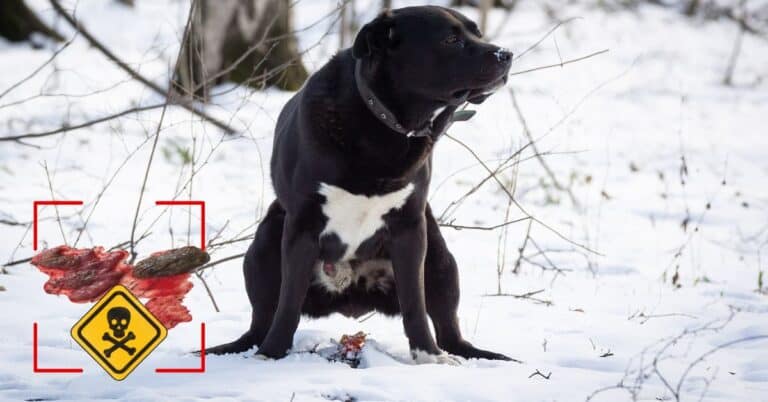Blood in Puppy Stool? Here’s What to Do, Even if Your Puppy is Acting Normal
As a dedicated puppy parent, spotting blood in your puppy’s stool can be a deeply alarming experience. It’s essential to understand that while this can be a sign of a minor issue, it could also indicate a more severe health concern. This blog post aims to guide you through understanding the potential causes, necessary actions, and ways to support your furry friend during this distressing time.

It’s normal for puppy stool to have a slight red or brownish tint to it. But if you’re seeing bright red, then there’s no doubt about it, your puppy has a bloody stool and needs help.
Jump to section
What Causes Blood in a Puppy’s Stool?
Bloody stool in puppies, medically termed as hematochezia or melena, can stem from various causes, ranging from dietary indiscretions to serious medical conditions.
- Dietary Issues: Sudden changes in diet, food intolerances, or ingesting something inappropriate can lead to gastrointestinal upset, resulting in blood in the stool.
- Parasites: Parasitic infections like hookworms, roundworms, and whipworms are common culprits, especially in puppies. Regular deworming is essential.
- Infections: Bacterial, viral, or fungal infections can cause bloody diarrhea. Parvovirus, particularly in unvaccinated puppies, is a notorious example.
- Inflammatory Bowel Disease: Chronic conditions like IBD can lead to bloody stool, often accompanied by weight loss and vomiting.
- Trauma or Injuries: Puppies tend to chew and ingest foreign objects, which can cause internal injuries leading to bloody stool.
- Dietary Changes: Puppies transitioning from milk to solid food can experience digestive upset that may result in bloody stool.
Immediate Steps to Take
If you notice blood in your puppy’s stool, it’s crucial to act promptly:
- Assess the Situation: Note the amount, frequency, and appearance of blood. Fresh, red blood often suggests lower intestinal issues, while darker, tarry stools imply bleeding in the upper intestines.
- Check for Other Symptoms: Observe if your puppy shows signs of distress, pain, lethargy, vomiting, or loss of appetite.
- Contact Your Vet: Regardless of the severity, a veterinary consultation is vital. Even if your puppy seems normal otherwise, don’t delay seeking professional advice. Note that if your vet is not open, some services provide live chat and video options to connect you with a vet.
What does your puppy’s stool look like?
Submit your puupy’s symptoms and chat with a vet now for immediate guidance!
What signs is your puppy showing?
(check all that apply)
Blood in Puppy Stool but Acting Normal? Here’s What You Should Know
It can be particularly confusing and concerning when you notice blood in your puppy’s stool, but they seem to be acting completely normal. While this situation can sometimes indicate a minor issue, it’s still important to address it promptly to rule out any potential underlying problems.
Possible Causes
- Mild Dietary Upsets: Sudden changes in diet or minor food intolerances can cause blood in the stool without affecting your puppy’s overall behavior.
- Minor Parasite Infestation: Early stages of parasitic infections might not show severe symptoms but can still cause bloody stool.
- Minor Gastrointestinal Irritations: Puppies are prone to gastrointestinal irritations from chewing on and ingesting non-food items.
What to Do
- Monitor the Stool: Keep an eye on your puppy’s stool for any changes in color, consistency, or amount of blood.
- Check for Other Symptoms: Even if your puppy seems normal, watch for any subtle signs of discomfort, changes in appetite, or energy levels.
- Consult Your Vet: Contact your veterinarian to discuss the symptoms. They might recommend bringing in a stool sample for analysis to check for parasites or infections.
- Maintain a Stable Diet: Ensure your puppy’s diet is consistent and avoid introducing new foods abruptly.
When to Seek Immediate Veterinary Care
- If the blood in the stool increases.
- If your puppy starts showing other symptoms like vomiting, diarrhea, lethargy, or loss of appetite.
- If the bloody stool persists for more than a day.
Remember, even if your puppy is acting normal, it’s crucial to address any signs of blood in their stool promptly. Early intervention can prevent minor issues from becoming major health concerns.
Diagnostic Tests and Treatment
Your vet might suggest several diagnostic tests, such as fecal examinations, blood tests, ultrasounds, or endoscopy, to determine the cause. Treatment varies based on the diagnosis and may include:
- Dietary changes or bland diets for minor upsets.
- Deworming medications for parasitic infections.
- Antibiotics or antiviral drugs for infections.
- Surgery in cases of severe trauma or tumors.
Ensure your puppy’s well-being without compromising your financial stability – enjoy peace of mind with Lemonade’s pet insurance offering comprehensive coverage, hassle-free claim processing through their user-friendly app, and up to 90% reimbursement rate, providing a seamless online experience. Sign up in seconds. Get paid in minutes.
What if Your Puppy Also Has Diarrhea or Is Vomiting?
If your puppy is also vomiting or has diarrhea, it may be hemorrhagic gastroenteritis. This serious condition is most common in small and toy breed puppies (Young Miniature Poodles, Miniature Schnauzers, Yorkshire Terriers, Dachshunds, and Maltese seem to be more commonly affected) and requires prompt veterinary care.
Hemorrhagic gastroenteritis is a life-threatening disease. Puppies with this condition will appear severely ill and, if left untreated, may die. If your puppy has this condition, it will need to be hospitalized and go under intensive treatment. If you are unsure, it’s strongly recommended to call your vet or, out of hours, a 24/7 telehealth helpline. It’s better to be safe than sorry.
Up to 90% Off Your Puppy’s Medical Bills? Only with America’s #1 Rated Pet Insurance. Learn more >>
Conclusion
Seeing blood in your puppy’s stool can be distressing, but understanding the potential causes and promptly seeking veterinary help can make a significant difference. Always keep a close eye on your puppy’s health and never hesitate to contact your vet when in doubt. Remember, timely action can save your puppy’s life and ensure their well-being.


Disclaimer: This Symptom Checker, including related information and articles on this Site, is for educational purposes only and is not a substitute for veterinary care provided by a licensed veterinarian.
Disclosure: This page contains some affiliate links. If you click and purchase, We may receive a small commission at no extra cost to you. We only recommend products and services we have verified and/or personally used. As an Amazon Associate, I earn from qualifying purchases.